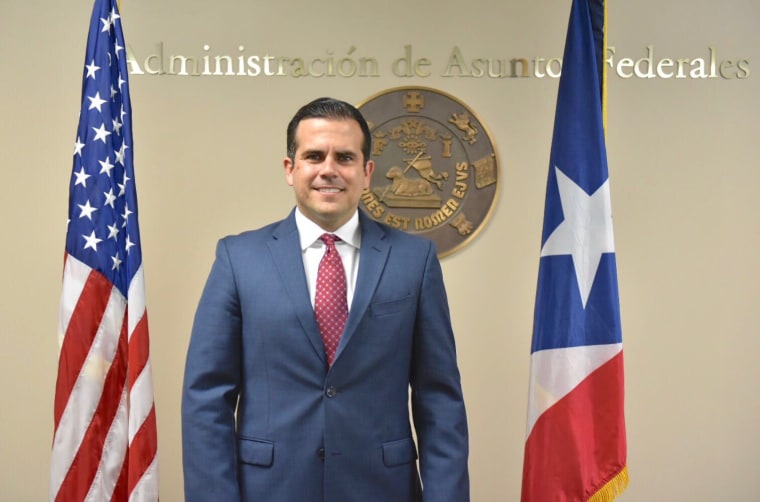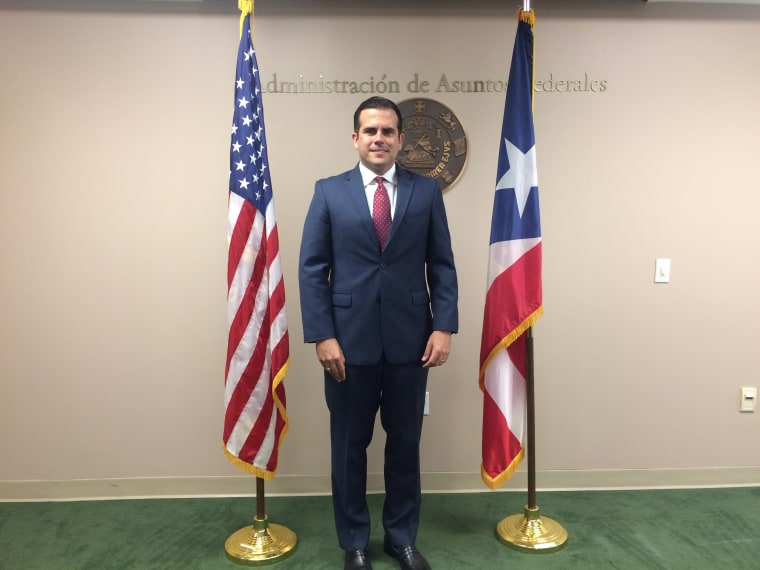WASHINGTON — Puerto Rico Gov. Ricardo Rosselló says solving a problem takes several strategies, so it makes sense for him to press Congress for statehood, while grappling with the territory’s debilitating money woes.
Rosselló has taken criticism over his insistence on campaigning for Puerto Rico's statehood while the U.S. territory reels from a $74 billion debt it is struggling to pay.
But he defended the statehood pursuit as necessary to resolving Puerto Rico’s debt crisis.
“We recognize there is a debt problem, we’re dealing with it," Rosselló told NBC Latino Wednesday. "But trying to say, ‘Hey guys, work on that and come back to us,’ is kind of ignoring the root cause of the problem, which is colonialism.”
Rosselló has been in and out of Washington laying the groundwork for a delegation of seven people, which he’ll appoint soon and will be here continuously to nudge Congress forward on Puerto Rico statehood.

The U.S. commonwealth held a vote June 11 in which 97 percent of those who voted supported statehood. However, opponents boycotted the referendum, so only about 23 percent of the population participated, a historically low turnout. Election turnout is often high in Puerto Rico.
Immediately after the election, Rosselló and his administration upped the energy around Puerto Rican statehood, capitalizing on the attention the U.S. territory has been getting because of its money crisis.
RELATED: Amid Historically Low Turnout, Puerto Ricans Vote for Statehood
But there is a long way to go in the process and Congress’ preoccupation with repealing Obamacare has bogged down other work. It's heading out of town for the July 4 break and the Senate put off its Obamacare repeal vote until next week. While the statehood question has bipartisan support, Rosselló will need top Republican backers to move anything forward.
The governor wouldn’t name who in Congress he has met with or who he is targeting. He did note that Rep. Joaquín Castro of Texas and Rep. Darren Soto of Florida, both Democrats, expressed support for Puerto Rico statehood after the plebiscite.
Rosselló, who was elected last year, said he thinks advancing statehood got some support from the administration, even if it wasn’t clear to some. White House Press Secretary Sean Spicer was asked about the vote at a press briefing, where he said the issue was in Congress' hands.
“This matter is something that's going to be determined now that the people have spoken in Puerto Rico,” Spicer said at the June 12 briefing. “This is something that Congress has to address. So the process will have to work its way out through Congress.”
Rosselló said he interprets Spicer’s comment that “the people of Puerto Rico have spoken” as a recognition of the results of the vote and noted that had not been said before under a previous administration.
“He [Spicer] also said Congress needs to act now. I understand why people would see that as punting — it’s actually calling upon Congress to act," said Rosselló, "In our view what he has said is: we recognize U.S. citizens have democratically taken a stand and based on that action, Congress needs to fulfill its duty and act."
RELATED: In D.C., Puerto Rico Governor Says 'People Spoke,' Pushes for Statehood
It’s unlikely Puerto Rico will see a leap forward on statehood, but Congress could hold hearings by the end of the year. The ultimate goal is to get approval in the House and Senate of an “admissions bill.”
The bill would set conditions for statehood and mandate a binding up or down vote on statehood by Puerto Rico’s electorate. The previous vote was not federally mandated and not binding.
The argument in the past from Congress had been that Puerto Ricans should decide whether they wanted a vote on statehood. Some members of Congress have been in a “holding pattern” waiting for the outcome of a plebiscite to decide whether to support statehood. Rosselló said he’s starting to see members come out of that “holding pattern.”
“So in the past five years, we’ve done that (held a plebiscite) twice" and statehood prevailed both times, he said. "The results are very clear, so what we are asking, we are not saying give us statehood now, we’re saying you need to listen to the will of the people of Puerto Rico,” Rosselló said.
“I don’t know if by the end of the year (Congress would act),” Rosselló said “But it is my hope that within our administration, we can establish the footprint to get this bill and hopefully vote over it before the administration ends.”

